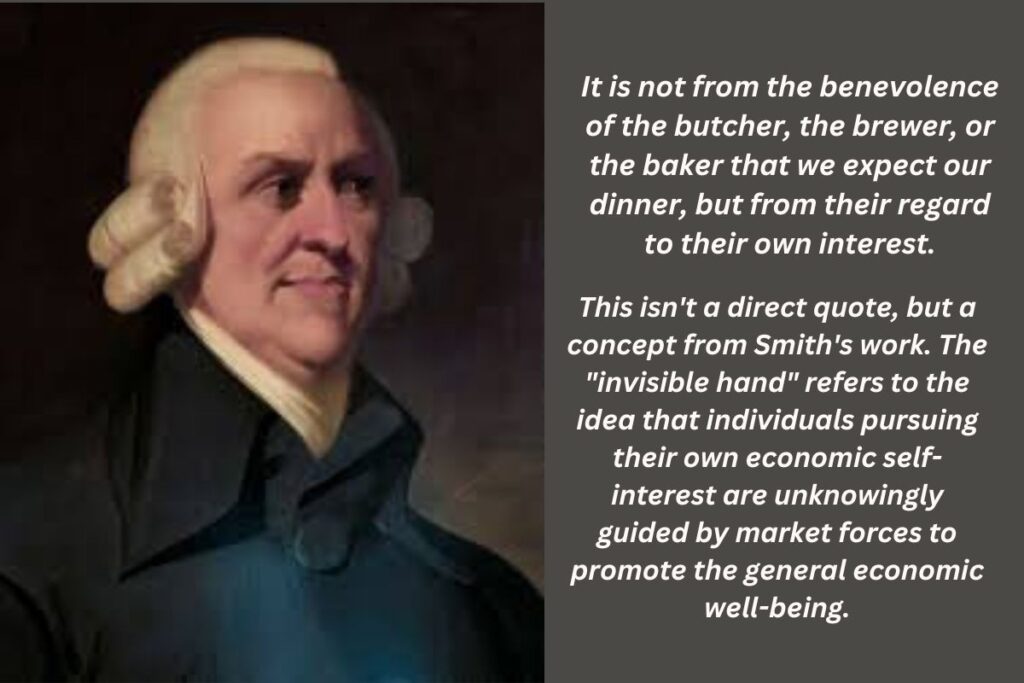In economic philosophy, few figures command as much respect and contemplation as Adam Smith. His magnum opus, “The Wealth of Nations,” serves as a cornerstone for understanding market dynamics, labor, and the role of government. Let’s delve into some of the most illuminating quotes by Adam Smith, examining their relevance in today’s economic landscape.
The Power of Specialization Adam Smith Quotes
Smith’s admiration for specialization shines through his words, emphasizing its role in boosting productivity and prosperity. He envisioned a society where individuals focus on tasks suited to their skills, benefitting everyone involved. He eloquently stated, “It is the great fertility of the productions of all the different arts, in consequence of the division of labour, which occasions, in a well-governed society, that universal opulence which extends itself to the lowest ranks of the people.”
Adam Smith Quotes A Catalyst for Progress
In Smith’s view, competition catalyzes societal advancement. He believed a competitive market fosters innovation, ensures fair pricing, and serves the public interest. “In common way, if any branch of trade, or any division of labor, be advantageous to the public, the freer and more common the competition, it will always be the more so,” he sagely remarked.
The Pitfalls of Government Intervention
Smith cautioned against excessive government intervention in economic affairs, warning against policies that hinder free enterprise. He recognized the tendency of policymakers to enact regulations that favor specific industries or groups, often to the detriment of the broader populace. As he observed, “To widen the market and to narrow the competition is always the passion of the dealers.”
Governments must tread carefully, avoiding measures that stifle innovation or distort market forces. Instead, they should focus on creating an environment conducive to entrepreneurship and investment, allowing the market’s invisible hand to guide economic activity.
Taxation and Redistribution
On the subject of taxation, Adam Smith advocated for fairness and transparency. He argued that taxes should be levied to minimize the burden and maximize clarity for taxpayers. “Every tax ought to be levied at the time, or in the manner, in which it is most likely to be convenient for the divination to pay,” he asserted.
Moreover, Smith emphasized the importance of proportionality, with each individual contributing according to their means. He recognized the role of government in providing essential services but warned against excessive taxation that stifles individual initiative.
The Invisible Hand of the Market Adam Smith Quotes
Perhaps Smith’s most enduring concept is that of the “invisible hand” guiding economic activity. He posited that individuals, driven by self-interest, inadvertently contribute to the collective good. “It is not from the benevolence of the butcher, the brewer, or the baker, that we expect our dinner, but from their regard to their interest,” he famously remarked.
This concept underscores the inherent harmony of free markets, where self-interested actions lead to optimal societal outcomes. Smith’s invisible hand reminds us of the power of decentralized decision-making and the resilience of market forces.
The Wealth of Nations and Adam Smith Quotes
In the vast landscape of economic theory, few names stand as tall as Adam Smith. Often regarded as the great leader of modern economics, Smith’s seminal work, “The Wealth of Nations,” profoundly influences how we perceive markets, trade, and the interplay between individuals and society. Smith elucidates fundamental principles that resonate even in today’s complex global economy through his poignant quotes and timeless wisdom.
The Division of Labour Adam Smith Quotes
Smith famously observed that the division of labor is a cornerstone of economic progress. He articulated that when individuals specialize in specific tasks, overall productivity increases, leading to a proliferation of goods and services. In essence, this specialization fosters what Smith describes as “universal opulence,” wherein even the lowest strata benefit from the abundance generated by diverse economic activities.
Adam Smith Quotes Prudence in Economic Decision-Making
Drawing parallels between household management and national governance, Adam Smith Quotes underscores the importance of prudent decision-making. Just as a sensible head of the family avoids wasteful expenditures, a well-governed nation should avoid activities that incur more cost than benefit. This principle advocates for rational resource allocation, emphasizing efficiency and cost-effectiveness in economic endeavors. “Just as a sensible head of the family avoids wasteful expenditures, a well-governed nation should avoid activities that incur more cost than benefit.”
The Virtue of Free Trade and Competition
Challenges of Market Distortions and Collusion
Government Intervention A Double-Edged Sword
Adam Smith Quotes Taxation and Public Finance
The Invisible Hand Market Forces at Work
Critique of Centralized Planning and Bureaucracy
Education and Social Institutions Adam Smith Quotes
Conclusion
As we reflect on Adam Smith’s timeless wisdom, we achieve invaluable insights into the complexities of economics. Adam Smith quotes serve as beacons of enlightenment, guiding us through the intricate workings of markets, competition, and government policy.
Smith’s principles remain as relevant as ever in today’s ever-evolving economic landscape. Whether pondering the benefits of specialization, the virtues of competition, or the perils of excessive intervention, we can draw inspiration from his profound observations.











